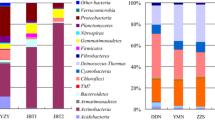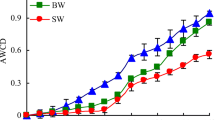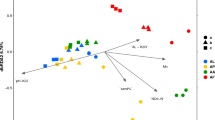Abstract
Saline-alkalisation of the soil environment and microorganism is a global challenge. However, relevant studies on the effects of saline-alkali stress on soil bacterial communities are limited. In this study, we investigated the effects of saline-alkali stress on the carbon source metabolic utilisation of the microbial community, bacterial diversity, and composition in soil using Biolog Ecoplate and 16S rRNA gene amplicon sequencing. Biolog Ecoplate results showed that saline-alkali stress decreased the metabolic activity and functional diversity, and changed the utilisation characteristics of carbon sources in soil microorganisms. Particularly, high level of saline-alkali stress significantly decreased the utilisation of carbohydrates and amino acids carbon sources. The results of 16S rRNA gene amplicon sequencing showed that high level of saline-alkali stress significantly reduced the diversity of soil bacterial communities. In addition, high level of saline-alkali stress significantly decreased the relative abundances of some key bacterial taxa, such as Gemmatimonas, Sphingomonas, and Bradyrhizobium. Furthermore, as saline-alkali content increased, the soil catalase, protease, urease, and sucrase activities also significantly decreased. Collectively, these results provide new insight for studies on the changes in the soil bacterial community and soil enzyme activity under saline-alkali stress.








Similar content being viewed by others
Data availability
Data used in this research are available upon request from the corresponding author.
References
Altizer S, Ostfeld RS, Johnson PTJ, Kutz S, Harvell CD (2013) Climate change and infectious diseases: from evidence to a predictive framework. Science 341(6145):514–519. https://doi.org/10.1126/science.1239401
Azadi N, Raiesi F (2021) Salinization depresses soil enzyme activity in metal-polluted soils through increases in metal mobilization and decreases in microbial biomass. Ecotoxicology 30(6):1071–1083. https://doi.org/10.1007/s10646-021-02433-2
Baker BJ, Lazar CS, Teske AP, Dick GJ (2015) Genomic resolution of linkages in carbon, nitrogen, and sulfur cycling among widespread estuary sediment bacteria. Microbiome 3(1):14. https://doi.org/10.1186/s40168-015-0077-6
Bandick AK, Dick RP (1999) Field management effects on soil enzyme activities. Soil Biol Biochem 31(11):1471–1479. https://doi.org/10.1016/S0038-0717(99)00051-6
Bardgett RD, Putten W (2014) Belowground biodiversity and ecosystem functioning. Nature 515(7528):505–511. https://doi.org/10.1038/nature13855
Benlloch S et al. (2002) Prokaryotic genetic diversity throughout the salinity gradient of a coastal solar saltern. Environ Microbiol 4(6):349–360. https://doi.org/10.1046/j.1462-2920.2002.00306.x
Berg G et al. (2014) Unraveling the plant microbiome: looking back and future perspectives. Front Microbiol 5:148. https://doi.org/10.3389/fmicb.2014.00148
Bull AT, Stach JEM, Ward AC, Coodfellow M (2005) Marine actinobacteria: perspectives, challenges, future directions. Antonie Van Leeuwenhoek 87(1):65–79. https://doi.org/10.1007/s10482-004-6562-8
Cao D et al. (2014) Halophyte plant communities affecting enzyme activity and microbes in saline soils of the Yellow River Delta in China. Clean Soil Air Water 42(10):1433–1440. https://doi.org/10.1002/clen.201300007
Chen LJ et al. (2017) Shifts in soil microbial metabolic activities and community structures along a salinity gradient of irrigation water in a typical arid region of China. Sci Total Environ 598:64–70. https://doi.org/10.1016/j.scitotenv.2017.04.105
Chen SF, Zhou YQ, Chen Y, Gu J (2018) fastp: an ultra-fast all-in-one FASTQ preprocessor. Bioinformatics 34(17):884–890. https://doi.org/10.1093/bioinformatics/bty560
Chowdhury N, Marschner P, Burns R (2011) Response of microbial activity and community structure to decreasing soil osmotic and matric potential. Plant Soil 344(1/2):241–254. https://doi.org/10.1002/clen.201300007
Classen AT et al. (2003) Community-level physiological profiles of bacteria and fungi: plate type and incubation temperature influences on contrasting soils. FEMS Microbiol Ecol 44:319–328. https://doi.org/10.1016/S0168-6496(03)00068-0
Cui Q et al. (2021) Biochar and effective microorganisms promote Sesbania cannabina growth and soil quality in the coastal saline-alkali soil of the Yellow River Delta, China. Sci Total Environ 756(2):143–151. https://doi.org/10.1016/j.scitotenv.2020.143801
Delgado BM et al. (2018) A global atlas of the dominant bacteria found in soil. Science 359(6373):320–325. https://doi.org/10.1126/science.aap9516
Du XJ, Hu SW (2021) Research progress of saline-alkali land at home and abroad over the past 30 years based on bibliometric analysis. J Anhui Agric Sci 49(18):236–239+242. (in Chinese)
Edgar RC (2013) UPARSE: highly accurate OTU sequences from microbial amplicon reads. Nat Methods 10(10):996–998. https://doi.org/10.1038/nmeth.2604
Egamberdieva D et al. (2010) Secondary salinity effects on soil microbial biomass. Biol Fertil Soils 46(5):445–449. https://doi.org/10.1007/s00374-010-0452-1
Elmajdoub B, Marschner P (2013) Salinity reduces the ability of soil microbes to utilise cellulose. Biol Fertil Soils 49(9):379–386. https://doi.org/10.1007/s00374-012-0734-x
Fang NN et al. (2020) Research progress on biological indicators of black soil fertility quality evaluation. Geol Resour 29(06):518–524+542. (in Chinese)
Floc’h JB et al. (2021) Inter-kingdom networks of Canola microbiome reveal Bradyrhizobium as keystone species and underline the importance of bulk soil in microbial studies to enhance Canola production. Microb Ecol. https://doi.org/10.1007/s00248-021-01905-6
Frankenberger WT, Bingham FT (1982) Influence of salinity on soil enzyme activities. Soil Sci Soc Am J 46(3):1173–1177. https://doi.org/10.2136/sssaj1982.03615995004600060011x
Garcia C, Hernandez T, Costa F (1994) Microbial activity in soils under Mediterranean environmental conditions. Soil Biol Biochem 26(9):1185–1191. https://doi.org/10.1016/0038-0717(94)90142-2
Ge Y, Zhang CB, Jiang YP (2011) Soil microbial abundances and enzyme activities in different rhizospheres in an integrated vertical flow constructed wetland. Clean Soil Air Water 39(3):206–211. https://doi.org/10.1002/clen.201000230
Guan SY, Zhang D, Zhang Z (1986) Soil enzymes and research methods. Agricultural Press, Beijing, p 260–339. (in Chinese)
Gupta A et al. (2018) Low-abundance members of the Firmicutes facilitate bioremediation of soil impacted by highly acidic mine drainage from the Malanjkhand Copper Project, India. Front Microbiol 9:2882. https://doi.org/10.3389/fmicb.2018.02882
Harada N et al. (2005) Effects of inoculation of phototrophic purple bacteria on grain yield of rice and nitrogenase activity of paddy soil in a pot experiment. Soil Sci Plant Nutr 51(3):361–367. https://doi.org/10.1111/j.1747-0765.2005.tb00041.x
He WX, Zhu ME (1997) Relationship between gill enzyme activity and soil fertility in Shaanxi Province. Acta Pedologica Sinica 12(4):392–398. (in Chinese)
He H et al. (2020) Soil bacterial community response to long term land use conversion in Yellow River Delta. Appl Soil Ecol 156(103709). https://doi.org/10.1016/j.apsoil.2020.103709
Insam H (2001) Developments in soil microbiology since the mid 1960s. Geoderma 100(3):389–402. https://doi.org/10.1016/S0016-7061(01)00029-5
Jannike W et al. (2006) Impact of salinity on soil microbial communities and the decomposition of maize in acidic soils. Geoderma 137:1–2. https://doi.org/10.1016/j.geoderma.2006.08.001
Jenkins SN et al. (2009) Actinobacterial community dynamics in long term managed grasslands. Antonie Van Leeuwenhoek 95(4):319–334. https://doi.org/10.1007/s10482-009-9317-8
Jing CL, Xu ZC, Zou P (2019) Coastal halophytes alter properties and microbial community structure of the saline soils in the Yellow River Delta, China. Appl Soil Ecol 134:1–7. https://doi.org/10.1016/j.apsoil.2018.10.009
Lee SM et al. (2021) Disruption of Firmicutes and Actinobacteria abundance in tomato rhizosphere causes the incidence of bacterial wilt disease. ISME J 15:330–347. https://doi.org/10.1038/s41396-020-00785-x
Lehmann J, Gaunt J, Rondon M (2006) Bio-char sequestration in terrestrial ecosystems-a review. Mitig Adapt Strateg Glob Chang 11(2):403–427. https://doi.org/10.1007/s11027-005-9006-5
Li X (2015) Studies on soil microbial community structure diversity in different degrees of saline-alkaline soil. Dissertation, Inner Mongolia Normal University. MA Thesis
Liu L, Wang B (2021) Protection of halophytes and their uses for cultivation of saline-alkali soil in china. Biology 10(5):353. https://doi.org/10.3390/biology10050353
Liu SS et al. (2018) Effect of heavy metals pollution on ecological characteristics of soil microbes: a review. Ecol Environ Sci 27(6):1173–1178. (in Chinese)
Magoc T, Salzberg SL (2011) FLASH: fast length adjustment of short reads to improve genome assemblies. Bioinformatics 27(21):2957–2963. https://doi.org/10.1093/bioinformatics/btr507
Mahanty T et al. (2017) Biofertilizers: a potential approach for sustainable agriculture development. Environ Sci Pollut Res 24(4):3315–35. https://doi.org/10.1007/s11356-016-8104-0
Martínez HP, Hirschn AM (2017) The nodule microbiome: N2-fixing rhizobia do not live alone. Phytobiomes 1(2):70–82. https://doi.org/10.1094/PBIOMES-12-16-0019-RVW
McFarlane DJ, George RJ, Barrett Lennard EG, Gilfedder M (2016) Salinity in dryland agricultural systems: challenges and opportunities. Springer International Publishing p 521–547. https://doi.org/10.1007/978-3-319-47928-6-19
Méheust R et al. (2020) Groundwater Elusimicrobia are metabolically diverse compared to gut microbiome Elusimicrobia and some have a novel nitrogenase paralog. ISME J 14(12):2907–2922. https://doi.org/10.1038/s41396-020-0716-1
Mielke KC et al. (2020) Does Canavalia ensiformis inoculation with Bradyrhizobium sp. enhance phytoremediation of sulfentrazone-contaminated soil? Chemosphere 255:127033. https://doi.org/10.1016/j.chemosphere.2020.127033
Mo X, Chen FJ, You C, Liu FD (2020) Characteristics and factors of soil enzyme activity for different plant communities in Yellow River Delta. Environ Sci 41(2):895–904. (in Chinese)
Nan Y, Petra M (2012) Response of microbial activity and biomass to increasing salinity depends on the final salinity, not the original salinity. Soil Biol Biochem 53:50–55. https://doi.org/10.1016/j.soilbio.2012.04.028
Raiesi F, Sadeghi E (2019) Interactive effect of salinity and cadmium toxicity on soil microbial properties and enzyme activities. Ecotoxicol Environ Saf 168:221–229. https://doi.org/10.1016/j.ecoenv.2018.10.079
Raiesi F, Razmkhah M, Kiani S (2018) Salinity stress accelerates the effect of cadmium toxicity on soil N dynamics and cycling: does joint effect of these stresses matter? Ecotoxicol Environ Saf 153:160–167. https://doi.org/10.1016/j.ecoenv.2018.01.035
Rath KM, Fierer N, Murphy DV (2019) Linking bacterial community composition to soil salinity along environmental gradients. ISME J 13:836–846. https://doi.org/10.1038/s41396-018-0313-8
Ratzke C, Gore J (2018) Modifying and reacting to the environmental pH can drive bacterial interactions. PLoS Biol 16(3):2004248. https://doi.org/10.1371/journal.pbio.2004248
Rietz DN, Haynes RJ (2003) Effects of irrigation-induced salinity and sodicity on soil microbial activity. Soil Biol Biochem 35(6):845–854. https://doi.org/10.1016/S0038-0717(03)00125-1
Saqib M, Akhtar J, Qureshi RH (2008) Sodicity intensifies the effect of salinity on grain yield and yield components of wheat. J Plant Nutr 31(4):689–701. https://doi.org/10.1080/01904160801926640
Setia R, Marschner P, Baldock J, Chittleborough D, Verma V (2011) Relationships between carbon dioxide emission and soil properties in salt-affected landscapes. Soil Biol Biochem 43(3):667–674. https://doi.org/10.1016/j.soilbio.2010.12.004
Shahid SA, Zaman M, Heng L (2018) Soil salinity: historical perspectives and a world overview of the problem. In: Guideline for salinity assessment mitigation and adaptation using nuclear and related techniques. Springer, Cham. Vienna, Austria, pp 43–53. https://doi.org/10.1007/978-3-319-96190-3_2
Shao JH et al. (2016) Silica fertilization and nano-MnO2 amendment on bacterial community composition in high arsenic paddy soils. Appl Microbiol Biotechnol 100(5):2429–2437. https://doi.org/10.1007/s00253-015-7131-y
Simone Cristina BB, Lucas Carvalho BA (2022) Microbiome under changing climate. implications and solutions. In: Kumar A (ed). Woodhead Publishing, England, pp: 69–84. https://doi.org/10.1016/B978-0-323-90571-8.00003-1
Song L, Niu X, Tian Y, Xiao Y (2021) Assessment of PAH degradation potential of native species from a coking plant through identifying of the beneficial bacterial community within the rhizosphere soil. Chemosphere 264:128513. https://doi.org/10.1016/j.chemosphere.2020.128513
Stackebrandt E, Goebel BM (1994) Taxonomic note: a place for DNA-DNA reassociation and 16S rRNA sequence analysis in the present species definition in bacteriology. Int J Syst Bacteriol 44(4):846–849. https://doi.org/10.1099/00207713-44-4-846
Sun X, Zhang L, Pei J, Huang LF (2020) Regulatory relationship between quality variation and environment of Cistanche deserticola in three ecotypes based on soil microbiome analysis. Sci Rep 10:6662. https://doi.org/10.1038/s41598-020-63607-2
Tang H, Xiao X, Li C, Pan X, Wang K (2020) Microbial carbon source utilization in rice rhizosphere and nonrhizosphere soils with short-term manure N input rate in paddy field. Sci Rep 10(1):6487. https://doi.org/10.1038/s41598-020-63639-8
Thomson BC et al. (2010) Vegetation affects the relative abundances of dominant soil bacterial taxa and soil respiration rates in an upland grassland soil. Microb Ecol 59:335–343. https://doi.org/10.1007/s00248-009-9575-z
Trasarcepeda C, Leiros MC, Gilsotres F (2008) Hydrolytic enzyme activities in agricultural and forest soils. Some implications for their use as indicators of soil quality. Soil Biol Biochem 40(9):2146–2155. https://doi.org/10.1016/j.soilbio.2008.03.015
Wagg C, Schlaeppi K, Banerjee S, Kuramae EE, Heijden M (2019) Fungal-bacterial diversity and microbiome complexity predict ecosystem functioning. Nat Commun 10(1):4841. https://doi.org/10.1038/s41467-019-12798-y
Waldrop MP, Balser TC, Firestone MK (2000) Linking microbial community composition to function in a tropical soil. Soil Biol Biochem 32(13):1837–1846. https://doi.org/10.1016/S0038-0717(00)00157-7
Wang M, Chen SB, Chen L, Wang D (2019a) Responses of soil microbial communities and their network interactions to saline-alkaline stress in Cd-contaminated soils. Environ Pollut 252:1609–1621. https://doi.org/10.1016/j.envpol.2019.06.082
Wang M, Chen SB, Chen L, Wang D, Zhao CM (2019b) The responses of a soil bacterial community under saline stress are associated with Cd availability in long-term wastewater-irrigated field soil. Chemosphere 236:124372. https://doi.org/10.1016/j.chemosphere.2019.124372
Wang Q, Garrity GM, Tiedje JM, Cole JR (2007a) Naive Bayesian classifier for rapid assignment of rRNA sequences into the new bacterial taxonomy. Appl Environ Microbiol 73(16):5261–5267. https://doi.org/10.1128/AEM.00062-07
Wang S, Sun L, Ling N (2020) Exploring soil factors determining composition and structure of the bacterial communities in saline-alkali soils of Songnen Plain. Front Microbiol 10:2902. https://doi.org/10.3389/fmicb.2019.02902
Wang XL et al. (2007b) Effect of dry soil layers on activity of soil urease and protease in alfalfa grassland. Res Soil Water Conserv 14(04):445–450. (in Chinese)
Xiao L et al. (2020) Effects of Cd and Pb on diversity of microbial community and enzyme activity in soil. Ecotoxicology 29(5):551–558. https://doi.org/10.1007/s10646-020-02205-4
Xun W et al. (2021) Specialized metabolic functions of keystone taxa sustain soil microbiome stability. Microbiome 9(1):35. https://doi.org/10.1186/s40168-020-00985-9
Yang WG et al. (2016) Investigating spatial distribution of soil quality index and its impacts on corn yield in a cultivated catchment of the Chinese Mollisol region. Soil Sci Soc Am J 80(2):317–327. https://doi.org/10.2136/sssaj2015.09.0335
Yao RJ et al. (2020) Response of soil characteristics and bacterial communities to nitrogen fertilization gradients in a coastal salt‐affected agroecosystem. Land Degrad Dev 32(1):338–353. https://doi.org/10.1002/ldr.3705
Yu PJ, Fan GH, Han KX (2018) Soil quality assessment based on soil microbial biomass carbon and soil enzyme activities. Res Agric Modern 39(1):163–169. (in Chinese)
Yusoff MZ et al. (2013) Influence of pretreated activated sludge for electricity generation in microbial fuel cell application. Bioresour Technol 145:90–96. https://doi.org/10.1016/j.biortech.2013.03.003
Zhang BL et al. (2019) Variation in Actinobacterial community composition and potential function in different soil ecosystems belonging to the arid Heihe River Basin of Northwest China. Front Microbiol 10:2209. https://doi.org/10.3389/fmicb.2019.02209
Zhang H et al. (2003) Gemmatimonas aurantiaca gen. nov. sp. nov. a gram-negative, aerobic, polyphosphate accumulating microorganism, the first cultured representative of the new bacterial phylum Gemmatimonadetes phyl. nov. Int J Syst Evol Microbiol 53(4):1155–1163. https://doi.org/10.1099/ijs.0.02520-0
Zhang HH et al. (2020) A study on the effects of salinity and pH on PSII function in mulberry seedling leaves under saline-alkali mixed stress. Trees 34:693–706. https://doi.org/10.1007/s00468-019-01949-9
Zhang T, Wan S, Kang Y, Feng H (2014) Urease activity and its relationships to soil physiochemical properties in a highly saline-sodic soil. J Soil Sci Plant Nutr 14(2):304–305. https://doi.org/10.4067/S0718-95162014005000025
Zhang Z, Han X, Yan J (2020) Keystone microbiomes revealed by 14 years of field restoration of the degraded agricultural soil under distinct vegetation scenarios. Front Microbiol 11:1915. https://doi.org/10.3389/fmicb.2020.01915
Zhao W et al. (2020) Apply biochar to ameliorate soda saline-alkali land, improve soil function and increase corn nutrient availability in the Songnen Plain. Sci Total Environ 722(20):137428. https://doi.org/10.1016/j.scitotenv.2020.137428
Zheng H, Dietrich C, Radek R, Brune A (2016) Endomicrobium proavitum, the first isolate of Endomicrobia class. nov. (Phylum Elusimicrobia)—an ultramicrobacterium with an unusual cell cycle that fixes nitrogen with a Group IV nitrogenase. Environ Microbiol 18(1):191–204. https://doi.org/10.1111/1462-2920.12960
Zhou Z, Wang C, Luo Y (2020) Meta-analysis of the impacts of global change factors on soil microbial diversity and functionality. Nat Commun 11(1):3072. https://doi.org/10.1038/s41467-020-16881-7
Zhu YG et al. (2018) Soil microbiome in China: progress and prospects. Agric Sci Eng China 30(03):6–12+38. (in Chinese)
Acknowledgements
We sincerely thank the editor and anonymous reviewers for their constructive and valuable comments to enhance the quality of our manuscript.
Funding
This study was supported by the National Natural Science Foundation of China (NSFC) (Grant numbers [31972507] and [U21A20182]), and Graduate Innovation Fund of Harbin Normal University (Grant number HSDBSCX2021-105).
Author information
Authors and Affiliations
Contributions
DY conceived and designed the experiments, performed the experiments, analysed the data, prepared figures and tables, and authored drafts of the paper. LT conceived and designed the experiments, prepared figures and revised the manuscript. YC performed the experiments and sample collection. JC conducted experiments and analysed data. LL conducted experiments and analysed data. CG conceived and designed the experiments, and revised the manuscript. All authors read and approved the final manuscript.
Corresponding author
Ethics declarations
Conflict of interest
The authors declare no competing interests.
Consent to participate
All the authors of this article have consented.
Consent to publish
All authors have approved the paper and agree with its publication.
Additional information
Publisher’s note Springer Nature remains neutral with regard to jurisdictional claims in published maps and institutional affiliations.
Supplementary information
Rights and permissions
Springer Nature or its licensor holds exclusive rights to this article under a publishing agreement with the author(s) or other rightsholder(s); author self-archiving of the accepted manuscript version of this article is solely governed by the terms of such publishing agreement and applicable law.
About this article
Cite this article
Yang, D., Tang, L., Cui, Y. et al. Saline-alkali stress reduces soil bacterial community diversity and soil enzyme activities. Ecotoxicology 31, 1356–1368 (2022). https://doi.org/10.1007/s10646-022-02595-7
Accepted:
Published:
Issue Date:
DOI: https://doi.org/10.1007/s10646-022-02595-7




